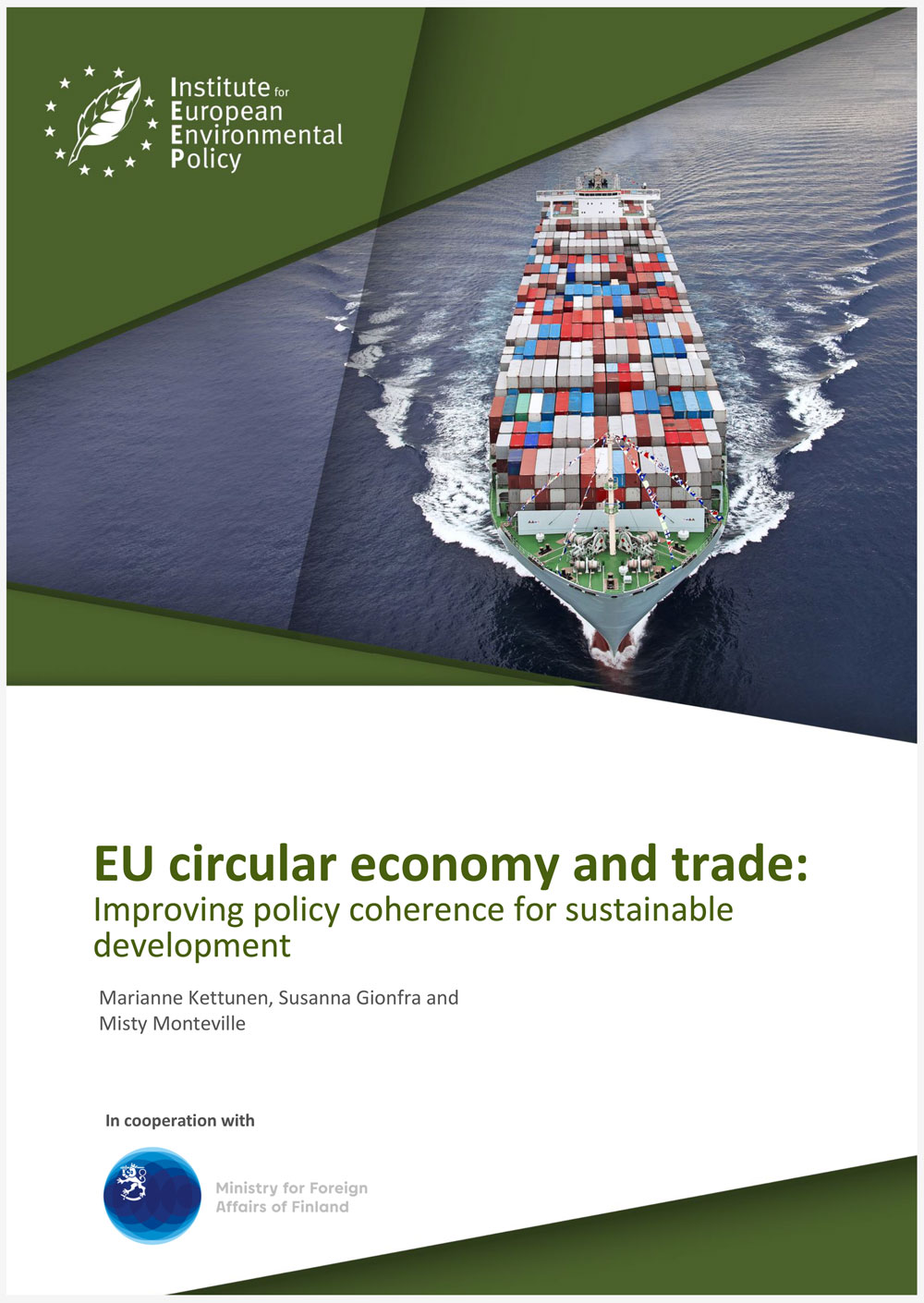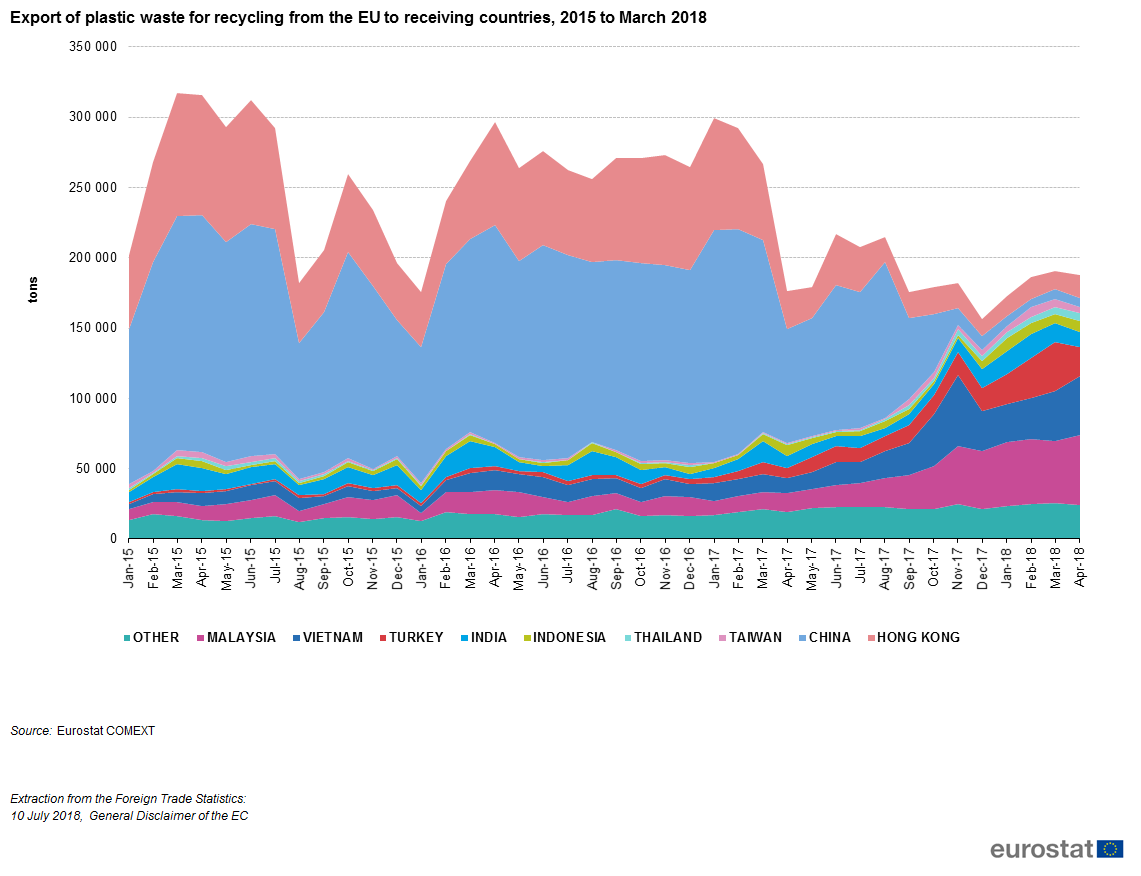Authors: Ellie Davey, Marianne Kettunen
IEEP’s report examines the foreseen impacts of implementing circular economy measures in the EU on international trade and – through trade – on third countries.
A number of policy recommendations are provided, calling for improved policy coherence between circular economy measures and trade policies.
Following the European Commission President’s recent call for the circular economy to become the first priority of the Green Deal, a new package of circular economy measures will likely be soon announced as part of the Communication on the Green Deal by the European Commission, expected in December.
One issue that has not yet made it to the forefront of the debate in Brussels is that of trade. In a context in which the use of non-renewable and renewable resources is increasing exponentially at the global level, addressing trade-related aspects of this policy file will be key to reach the economic, social and environmental objectives of the circularity, both within Europe and globally.
‘Closing the loop’ with circular economy
 The new IEEP report explores the complexity of the spillover effects caused by the EU’s shift to a circular economy The new IEEP report explores the complexity of the spillover effects caused by the EU’s shift to a circular economy |
The transition to a circular economy in the EU is vital to limit the significant environmental threats occurring as a result of a long-standing culture of over-consumption. Offering an alternative to traditional unsustainable linear consumption, the circular economic model focuses on maintaining the value and life cycle of raw materials to reduce waste.
This shift to circularity reflects a way to foster sustainable development, alongside delivering the 2030 Sustainability Agenda. In 2015, the EU adopted its ambitious Circular Economy Package, to improve resource efficiency, and support the implementation of the Sustainable Development Goal 12.
The Circular Economy Package includes the 54-Point Action Plan, in the core of which are various EU Directives that address issues concerning single-use plastic, landfill, recyclability, biodegradability and waste management.
Global impacts of the EU’s circularity shift
The circular economy within the EU does not, however, concern only the EU. It is important to understand that the EU’s shift to a more circular economic model will inevitably have external spillover effects beyond EU borders.
An EU circular economy will have global impacts on resource flows of raw materials, including Critical Raw Materials (CRM) and Secondary Raw Materials (SRM), with the potential to either accelerate or hinder sustainable development in third countries.
Rise of trade in recyclables with negative impacts
As the EU’s circular economy develops, recyclable materials have become a tradeable commodity, often exported to third countries for reprocessing.
 Export of plastic waste for recycling from the EU to receiving countries, 2015 to March 2018. Full-screen Source: Eurostat Export of plastic waste for recycling from the EU to receiving countries, 2015 to March 2018. Full-screen Source: Eurostat |
In theory, there can be many associated benefits of waste imports and exports. For third countries, EU waste imports can provide a source of secondary raw material and related income, whilst simultaneously supporting the EU’s capacity to meet recycling and landfill reduction targets.
The reality, however, has been less rosy. Until 2018, China imported most of the EU’s plastic waste, but due to the lack of universal standards on hazardous substances, contamination and quality, the country deemed the surge of imports unmanageable, imposing a waste import ban.
Following China’s halt in EU waste imports, underprepared countries like Malaysia and Indonesia received an influx in redirected waste.
As seen from Indonesia in the news recently, waste importers are often not equipped with the appropriate infrastructure to process and recycle waste imports effectively. The immense pressure on importing countries’ infrastructure has been attributed to an increase in non-circular solutions like incineration, landfill, or dumping in waterways, which poses risks to environmental and human health.
Although a global circular loop has the potential to be mutually beneficial, it is clear that waste exports for recycling are currently at a level that exceeds third countries’ capacity to process them. The current state is unsustainable and significantly hinders third countries’ achievement and implementation of the SDGs.
| There is a need for a more globally aware circular economy policy in the EU, one that is inclusive for all, including third countries |
There is clearly a need for a more globally aware circular economy policy in the EU, one that is inclusive for all, including third countries. This is vital to boost their journey along the sustainable development trajectory, as opposed to jeopardising their achievement of key SDGs.
What’s trade got to do with it?
The benefits of an EU circular economy can be harnessed globally if recyclable waste exports are traded within effective EU Free Trade Agreements (FTAs) and policies that fully integrate sustainable development concerns.
The potential – and responsibility – for that lies in the hands of the new Trade Commissioner, Phil Hogan, who highlighted his future plans for EU trade policy during his Commissioner-designate hearings in September.
A focal point of Hogan’s hearing was his plans for improvements for the Commission’s 15-Point Action Plan, which was introduced in 2018 to make FTA Trade and Sustainable Development (TSD) chapters more effective in delivering sustainable development.
The plan suggests the implementation of 15 actions to strengthen the EU FTAs, to improve the externalities of EU trade agreements on third countries.
So far the role of trade agreements as a tool to progress sustainable circular economic integration has been largely underused. Only two out of the existing EU FTAs explicitly mention the circular economy, reflecting both the relative novelty of the policy concept while demonstrating the need for this focus to intensify.
When questioned on his future plans for the TSD standards within FTAs, Hogan responded that “the 15-point action plan on the sustainability agenda and the TSD Chapter, is very important to me”.
He concluded that he fully supports the use of trade instruments in the implementation of the TSD Chapter. However, when challenged on his tangible plans to strengthen FTAs, Hogan explained that he would like to see “international conventions/agreements enshrined in the FTAs”, but failed to disclose any further details on how he plans to execute this.
Towards better policy coherence
| The IEEP reportcalls for improved policy coherence between circular economy measures and trade policies, with due links to the EU development cooperation. |
Reflecting on Hogan’s hearing, it is clear that he appreciates the need to “ensure that trade is sustainable”, and that “trade policy must contribute to addressing global challenges such as climate change and protecting the environment”.
How these promises develop in the future will be of key importance to securing the EU’s contribution to SDGs in the global context, as will be the European Commission’s plans to proceed with the circular economy, which has been cited as the “number one priority” in the upcoming European Green Deal.
In addition, it is important to recognise the role of development cooperation as a contributor towards sustainable trade. The WTO’s ‘Aid for Trade Initiative’ (AfT), launched in 2005, mobilises resources to help developing countries participate in international trade flows. The EU AfT can play a supporting role in third country’s ability to shift to and benefit from a (global) circular economy, and as an enabler of the SDGs.
Based on the insights of the IEEP report, ensuring coherence between these three policy areas needs much more explicit consideration than it has been receiving in the past.
Sources:
EURACTIV (2019). ‘Circular economy erected as ‘number one priority’ of European Green Deal’
European Commission (2018) Press Release: ‘Closing the loop – An EU action plan for the Circular Economy’.
European Commission (2018). ‘Commissioner Malmström unveils 15-point plan to make EU trade and sustainable development chapters more effective’.
European Commission (2018). ‘Feedback and way forward on improving the implementation and enforcement of Trade and Sustainable Development chapters in EU Free Trade Agreements’.
European Parliament (2019). ‘Committee on International Trade: Hearing of Phil Hogan Verbatim Report’.
European Parliament (2019).Hearings of European Commissioners-designate: Phil Hogan (Trade).
Reuters (2019). ‘Indonesia threatens to report countries for refusing to take back waste’.

